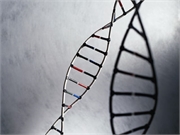Association signal spanning several genes ID’d at 3p21.31; signal at 9q34.2 coincides with ABO locus
FRIDAY, June 26, 2020 (HealthDay News) — Patients with COVID-19 and severe disease have associations at locus 3p21.31 and 9q34.2, which are significant at the genomewide level, according to a study published online June 17 in the New England Journal of Medicine.
David Ellinghaus, Ph.D., from Christian-Albrechts University in Kiel, Germany, and colleagues conducted a genomewide association study involving 1,980 patients with COVID-19 and severe disease at seven hospitals in the Italian and Spanish epicenters of the severe acute respiratory syndrome coronavirus 2 pandemic to identify potential genetic factors involved in COVID-19 development. The final analysis included data from 835 patients and 1,255 control participants from Italy and 775 patients and 950 control participants from Spain. A total of 8,582,968 single-nucleotide polymorphisms were analyzed.
The researchers detected cross-replicating associations with rs11385942 at locus 3p21.31 and with rs657152 at locus 9q34.2; in meta-analysis of the two case-control panels, these were significant at the genomewide level (odds ratios, 1.77 and 1.32, respectively). The association signal at locus 3p21.31 spanned SLC6A20, LZTFL1, CCR9, FYCO1, CXCR6, and XCR1. The association signal at 9q34.2 coincided with the locus of the ABO blood groups; in this cohort, the risk was higher in blood group A versus other blood groups (odds ratio, 1.45), while a protective effect was seen in blood group O (odds ratio, 0.65).
“Further exploration of current findings, both as to their usefulness in clinical risk profiling of patients with COVID-19 and toward a mechanistic understanding of the underlying pathophysiology, is warranted,” the authors write.
Copyright © 2020 HealthDay. All rights reserved.








